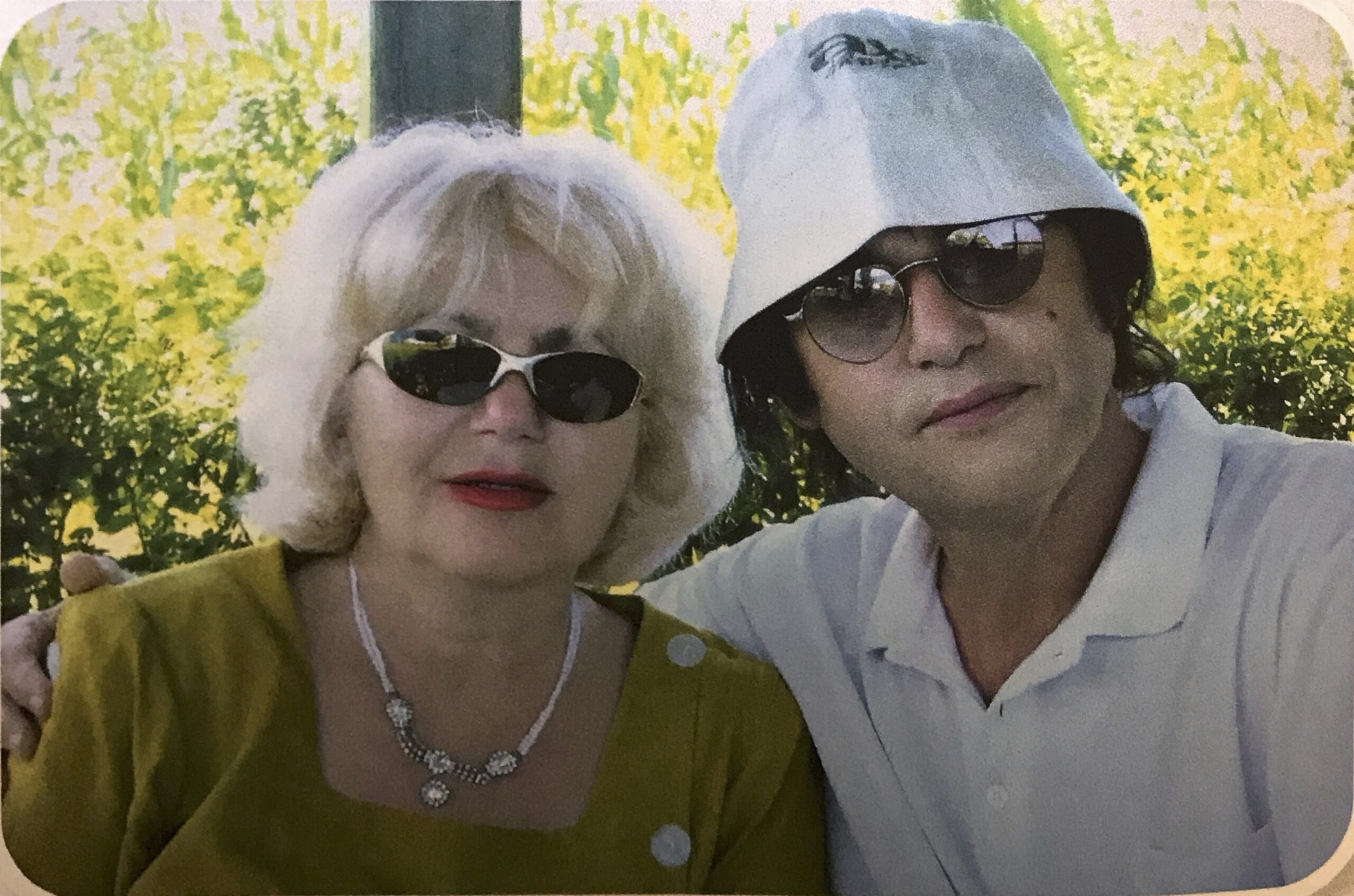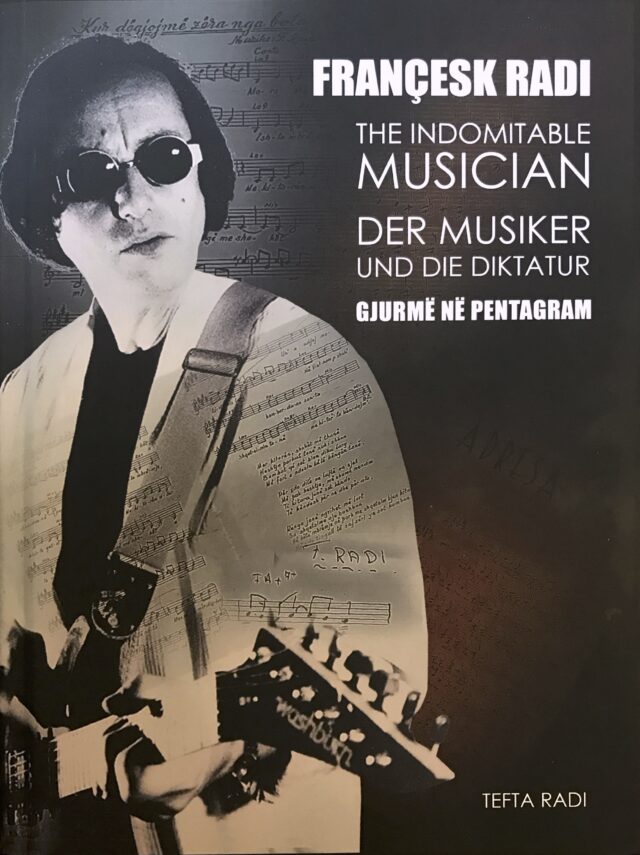By Elmira Muja

Such a complete life, offering happiness and understanding to so many people, and leaving a genuinely enduring legacy. On April 3, 2017, Francesk Radi, one of the best Albanian musicians, departed from this life.
The new book “The Indomitable Musician” by Tefta Radi, reveals details about Francesk Radi that we were unaware of before. Tefta, a renowned journalist, skillfully portrayed her husband Franko, capturing all the nuance from his early years to his final days.
Tefta genuinely and lovingly dedicates this book to her beloved Franco, from whom she learned about humanity without an agenda, how to love, how to forgive, how to work, and how to be tolerant in life.
Billy Joel, a well-known American musician, once said, “Musicians want to be the loud voice for so many quiet hearts. “
His words bring to mind two songs by Francesk Radi that helped to usher in a new age of light music in Albania.
It was Francesk Radi who gave Albanian music fans a window throughout the oppressive communist era. His debut songs, “The Address” and “The Bicycle,” broke the mold from cliché songs that had to contain at least one phrase associated with communism. During those years, both songs became anthems for the youth of Albania. But that wasn’t for very long.
I’m not sure why the Albanian communists were so outraged by these songs which the Albanian people adore so much. Franco and his song’s fans received punishment. Radio and television broadcasts of the songs were outlawed. In addition to being prohibited from airing on radio or television, these songs were also referred to as “songs that perpetuate the ideology of the Western world.” Regretfully, the songs were permanently removed from the Albanian Radio-Television collection. However, they will always be remembered by the generation of the 1970s.
It should be mentioned that “The Address” and “The Bicycle” were also the first songs ever to be broadcast as music videos. They are still regarded as the masterpieces and they will remain evergreen in their genre for a long time to come.
Things went from bad to worse under the communist rule for Franko. The artists whose music captivated Albanian hearts, was exiled from Tirana and ordered to be re-educated “among the working class” in Fushe-Arrez, a woodcutters and miners’ settlement in Northern Albania.
How come Francesk Radi was interned? How terrible and ironic that while the Albanian public loved his two songs, they brought him such suffering and an unjust punishment. The tunes are fairly straightforward and filled with a romantic idyll. In the song “The Address,” a young guy spots a beautiful girl and inquires about her address, where she lives.
Here are a few quotes from the song’s lyrics.
….When our hands come together, oh, how fiercely our hearts beat.
And the address I didn’t know
You gave it to me
And that evening, as we parted,
Through love, I went.
You gave me the happiness’s address.
A similar subject is brought by of “The Bicycle” song. Every day, a young boy witnesses a gorgeous girl riding her bicycle across the bridge. It’s springtime in Tirana, and the mimosas are in full flower. Every day, the boy stands on the bridge, watching the beautiful girl pass by on her bicycle.
Here are a few lines from the song “The Bicycle”.
I’m standing on the bridge, awaiting the sound of a bell.
and now it’s ringing at the bend.
You’re not, but I’m mistaken.
I don’t know why I search for your eyes in every mimosa.
You’re in the corner here.
How odd, why do I think you’re everyone else?
What was it about these two songs that brought the toughest punishment for Francesk Radi? The dictator did not love his people; he sought vengeance when he saw them singing beautiful tunes. And the dictator was even more ludicrous in labeling these artists “enemies of the people.”
The tyrant feared scholars and musicians even more as music had a greater ability to penetrate people’s souls and brains. Thus, Albania’s cultural revolution got underway. For the Albanians, even more dark days lay ahead.
There were no longer any songs that are described as romantic. The songs had to have a leitmotif now that is dedicated to the dictator, his labor/communist party, and the working class, or they would not be broadcast.
For Franko returning to Tirana would mean returning to square one. In 1981, following a protracted process of “re-education,” Franko returned to Tirana. Once more, desperation ensued after going two years without a job. Ironic that a musician with his caliber could not even be hired by the National Radio and Television Symphony Orchestra, where he began his career.
Despite the challenging circumstances, wherein the magnitude of spiritual devastation surpasses that of economic turmoil, Francesk Radi remained undeterred in his pursuit of creating aesthetically pleasing musical compositions.
Francesk Radi, a multifaceted musician, would once again win the hearts of the Albanian people. Deep down, he was saddened by the reality. Hopelessness in Albania would be one day the theme of another Francesk Radi’s song, “We met this fate” which portrays this pain and uncertainty.
You have money, but you don’t feel safe.
You don’t have any money.
You’re not as safe.
We live in love
Inside the fortified door
Foreigners toil,
Albanians destroy
We met this fate
Every Albanian can identify with one of Franko’s dozens of songs due to his wide variety of originality. Franko never died—he merely stopped performing live—and his songs and voice will live on.
With what has been written about him and the legacy he has left behind, Franko is still very much alive. Franco is a legend and a myth. Legends live forever!

